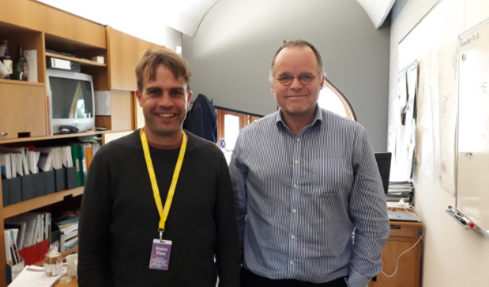
Gavin Crichton, Artistic Director Active Inquiry
Between March-May 2019 I received Creative Scotland’s See Learn Share funding to shadow MSPs and Civil Servants in the Scottish Government to learn more about policy-making processes. I intend to use this learning to see how our participatory theatre can enable people to have a deeper say in the decisions that affect their lives. We are surrounded by a language of participation in all aspects of our lives but many institutions lack the tools to meaningfully engage people. Could participatory theatre be one way of doing this?
In one of the committee rooms at the Scottish Parliament members of the Shakti Theatre Company were hugging and congratulating one another. They had just performed a powerful play about domestic abuse to the First Minister Nicola Sturgeon, who had thanked them and posed for photographs before heading off to other commitments. As women with lived experience, they all felt that their story had been heard by the most powerful person in the country who was supportive and attentive as they played out their piece.
We now feel we need to make theatre as politics and not just political theatre- August Boal
The Shakti Theatre Company is run in partnership with Active Inquiry and Shakti Women’s Aid, who support BME women and their families who are survivors of domestic abuse. The women were clear that they wanted their voices and their story to be heard, and now they had been. However, once the First Minister had left, the group began having fun at the committee table, posing for photos sitting in the big leather chairs and pretending to talk into the microphones. As I watched them playing politics a truth dawned on me; telling your story is just the first step. In order to make a real change we need to move beyond just telling our story to understanding how to play this game too.
Legislative Theatre is a concept developed by Brazilian Theatre Director Augusto Boal in the 1990s. When he was elected a City Councillor for Rio de Janeiro he wanted to use theatre to engage people whose voices were not normally heard in the Chamber. Thirteen new laws were passed using this process. You can see more about how Legislative Theatre works in this short animation we produced along with three other theatre companies across Europe.
We have been interested in how Legislative Theatre might work in Scotland for some time. In 2014, we initiated the Creative Scotland funded Resilience project to experiment with this. Recently we have also been part of LegiLAB, a European project exploring how Legislative Theatre could be used across Europe.
I realised that the next step was to understand how the political systems and policy-making processes worked in order to understand if there was any potential for participatory theatre to be a part of them. With the help of the Shadowing Scheme from Leith Open Space I set up opportunities to shadow Andy Wightman MSP and the Scottish Government’s Out of School Childcare Team.
Through shadowing Andy Wightman and members of his team responsible for research and policy I learned how the Scottish Parliament worked. In addition, I spent time with the Scottish Parliament Information Centre (SPICe) and the Scottish Parliament Community Outreach Team. I am continuing to meet with members from the Community Outreach Team and the new Committee Engagement Unit to explore the possibility of how theatre can be used in this process.
I also had the opportunity to shadow this team at the Scottish Government as they developed a new policy for Out of School Childcare. This essentially means after school clubs, breakfast clubs and holiday clubs and has to take account of a range of issues including benefits, inflexible employers and the predominant, unfair responsibility on women to be carers. This team were very open to new ways of engagement as they formed a Position Paper to be published later this year.
A few meetings turned into the offer of further work, and I had the opportunity to run drama workshops for children and to create a new piece of forum theatre aimed at parents as a result. This was an amazing opportunity for Active Inquiry and me to consider questions around how we could enable participants and audiences not to feel manipulated, but ensure that they were feeding into what the Scottish Government needed to hear. It made us ask questions about the form of forum theatre we were using and how we needed to structure our workshops with a different focus.
It has given us much to think about as we move forward, extend our links in this area and strengthen the ones we have already made. It is a difficult road ahead but there are opportunities for theatre to make sure that people are involved in processes and decisions that affect their lives.
To paraphrase August Boal, we now feel we need to make theatre as politics and not just political theatre.